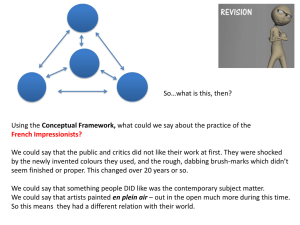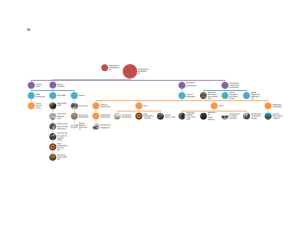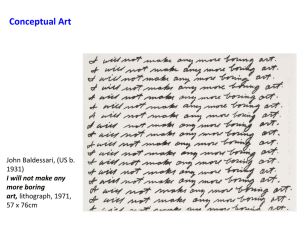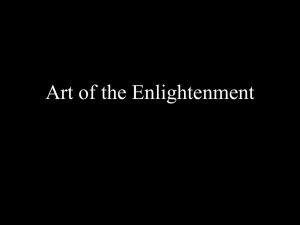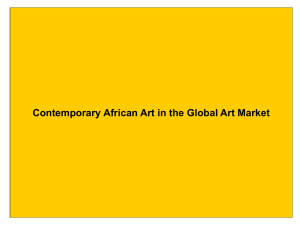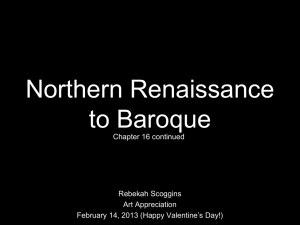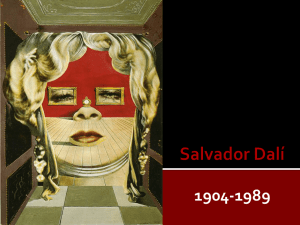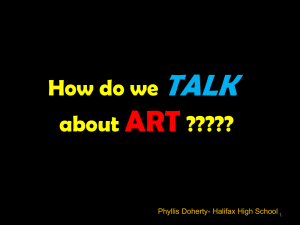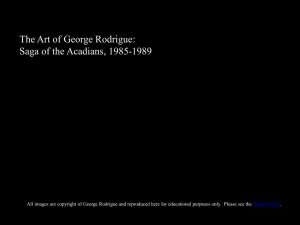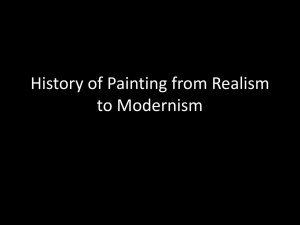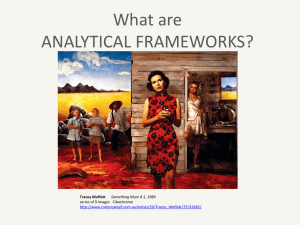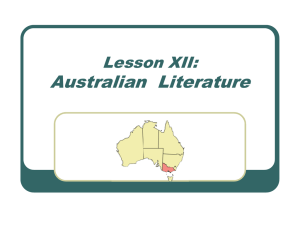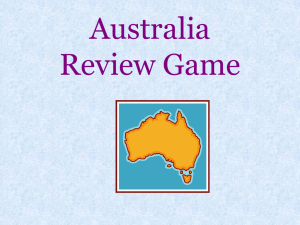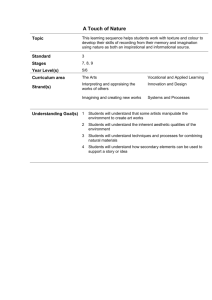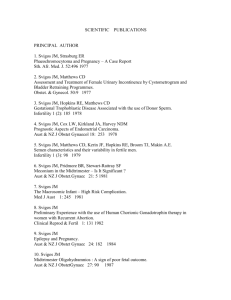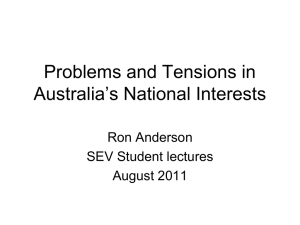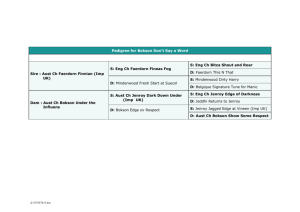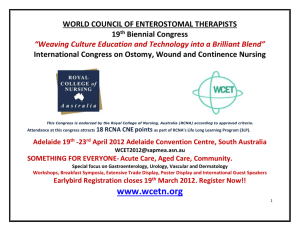PRELIMINARY MATERIAL REVIEW
advertisement
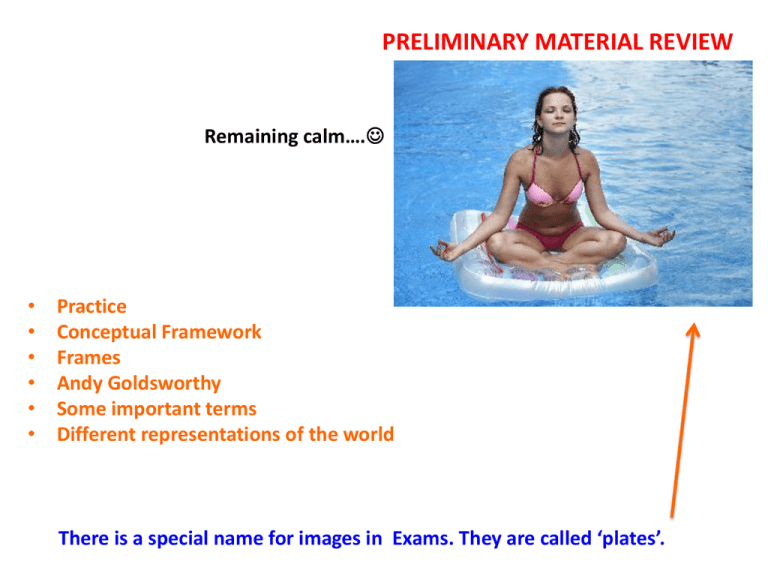
PRELIMINARY MATERIAL REVIEW Remaining calm…. • • • • • • Practice Conceptual Framework Frames Andy Goldsworthy Some important terms Different representations of the world There is a special name for images in Exams. They are called ‘plates’. PRACTICE. In the HSC Syllabus, the word ‘Practice’ refers to all the content of this course. It’s divided up into 3 areas. (They all start with the word ‘art’….) PRACTICE CONCEPTUAL FRAMEWORK Why do I insist on a picture of David Beckham? Why why why. What is this Conceptual Framework all about??? Someone who has NOT answered this before needs to respond this time. Come on. Try for goal…imagine the roar of the crowd… Re-visiting Andy Goldsworthy. Quote: “For me looking, touching, material, place and form are all inseparable from the resulting work. It is difficult to say where one stops and another begins. Place is found by walking, direction determined by weather and season. I take the opportunity each day offers: if it is snowing, I work in snow, at leaf-fall it will be leaves; a blown over tree becomes a source of twigs and branches.” Goldsworthy creates a work, then photographs it, then leaves it. It gradually (sometimes quickly, as with this work) will fall apart. His work is ephemeral. No one may see it in place at the time he’s creating it. It may be just him out in the environment, creating these installations. Floating hole, Lougborough Leicestershire 1986 • Uses just the natural materials , whatever he finds in the environment. • Doesn’t go in with high-tech gear to create the works. It’s what he can do himself or with an assistant. • Because he simply goes out and sees what he might come across, he does not have total control over what will be created on any given day. This is deliberate. • Rather than describing his world, he intervenes in it in a non-damaging way, then lets it return to what it was, in it’s own time. • A bit like John Wolseley, he collaborates with his environment. Large fallen oak tree - used leaves with branches still attached for supporting structure inside ball. Dumfriesshire 15 September 1985 Bright sunny morning, frozen snow, cut slab, scraped snow away with a stick, just short of breaking through. Izumi-Mura, Japan. 19 December 1987 “My approach to photograph is kept simple, almost routine. All work, good and bad, is documented. I use standard film, a standard lens and no filters. Each work grows, strays, decays—integral parts of a cycle which the photograph shows at its height, marking the moment when the work is most alive.” Thinking about the Conceptual Framework, what could we say about his audience? Which is the artwork? Is it the ephemeral installation, or the photographic documentation he makes and then sells? If we were asked to discuss Goldsworthy’s work using the Conceptual Framework, What would that question actually be asking us to do? Take a few moments to Discuss his art practice, using The Conceptual Framework. Name at least 3 aspects or features. Ends of Bamboo, 1987, Japan. What are the Frames? FRAMES • They are different ways of looking at, or talking about, or thinking about, an artwork. • There are four Frames…but for the exam we’ll only concern ourselves with three (YIPPEE!!) . • And our three finalists are…. These cats will give you absolutely no help in answering questions about Frames. Subjective Frame. What could we say about this image, using the Subjective Frame? JMW Turner , (U.K. 1775-1851) Snow Storm: Hannibal and his Army Crossing the Alps, 1812, oil paint on canvas, 146 x 237 cm Now please stand up….. The Cultural Frame…What could we say about this image, using the Cultural Frame? Tom Roberts (Aust.1856-1931) The Slumbering Sea, Mentone, 1887, oil on canvas, 51 x 76 cm Structural Frame: What could we say about this image, using the Structural Frame? Arthur Streeton (Aust. 1867-1943), Fire’s on, 1891, oil on canvas 184 x 122 cm There is a critical difference between they way these two images describe space. Around the time of the Renaissance (14th century) artists started using techniques to give a sense of depth to their work. Psalter page from 13th Century. Piero Della Francesca, ( Italian, 1415 – 1492) The Flagellation of Christ,1455, Oil and tempera on panel, 59 x 82 cm A different perspective technique can be seen here…. Let’s have another go with the Structural Frame with this plate. What can we say about Its composition, style or use of symbols/codes? Claude Lorrain (French, 1600 -1682.) Pastoral Landscape: Roman Campagna, 1639, Oil on canvas 101 x 135 cm. Another painting by Claude, this time describing a scene from Greek mythology. Paris was asked to judge the most beautiful of three Goddesses. Using ancient myths, historical figures or stories from the Bible is referred to as what genre? Claude was probably not all that interested in myths. He was very interested in describing beautiful skies and atmospheres though, as we can see. He lived in a time where describing landscape just for itself was not seen as really worthwhile, hence the addition of historical or mythical figures. Claude Lorrain (French, 1600 -1682) The Judgment of Paris, 1645/1646 oil on canvas, 112 x 149 cm. Some more practice….using the Structural frame, what can we say about this work? Try to name 3 features or aspects. Arthur Streeton (Aust. 1867-1943) Spirit of the Drought, c.1895, oil on wood panel, 35 x 37 cm In their artworks, artists represent various ideas about their world. What can we say about the ideas represented in this work by Australian Impressionist Tom Roberts? Tom Roberts (Aust. 1856-1931) Shearing the Rams,1890, oil on canvas, 122 x 183cm What ideas are being represented here? It’s always more than a simple image…there are messages being conveyed with an artwork. There is meaning. Arthur Streeton (Aust. 1867-1943) Golden Summer Eaglemont, 1889, oil on canvas, 81cm x 152cm Seen the WIKI site yet? You can view all our PowerPoints, with notes, in full living colour…Google ‘gymea TAFE wiki’ to get you there… WIKI
